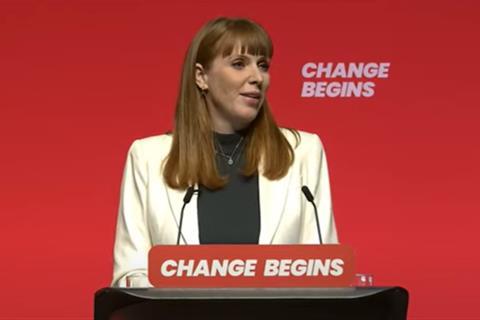Housing secretary also commits to build more social homes than are lost within first financial year of new government
The government plans to bring forward a remediation acceleration plan this autumn to speed up removal of dangerous cladding from buildings.
Opening the Labour Party’s annual conference in Liverpool this morning (Sunday), housing secretary Angela Rayner set out a package of measures meant to tackle the UK’s housing crisis.

The commitment to a remediation plan comes weeks after the damning findings of the Grenfell Tower Inquiry Report, as well as a fire at a block of flats in Dagenham where remediation work had not yet been completed.
Rayner said that working with the prime minister on the inquiry was “the most sobering moment of my career”, describing it as “a fatal failure of market and state”.
“It is completely unacceptable that we have thousands of buildings still wrapped in unsafe cladding seven years after Grenfell,” she continued.
“That’s why we will bring forward a new remediation action plan this Autumn to speed up the process and we’ll pursue those responsible – without fear or favour.”
The deputy prime minister’s speech, which opened the conference, repeated the austere rhetoric of her party’s prime minister and chancellor over recent months, with Rayner stressing that “we can’t wish our problems away”.
“Things can get better if we make the right choices”, she said.
The secretary of state also set out other measures intend to address the UK’s housing crisis, some of which have already been announced as part of the government’s Renter’s Rights Bill, which received its first reading on 11 September.
These also included consulting on a new Decent Homes Standard for the social rented and private rented sectors and bringing forward legislation on Awaab’s Law this autumn.
The latter will allow tenants to request action on mould and leaks within a specified timeframe. Under previous Tory plans it would have applied only to the social rented sector, but Labour intends to extend its application to the private rented sector.
She also set out plans to apply new access to information requirements to social housing landlords, which are intended to help tenants get improvements for their homes, and promised to introduce a competence and conduct standard for the sector to ensure staff have the right skills and experience.
Matt Downie, chief executive of the charity Crisis, welcomed the proposals, saying that “for decades we have allowed social housing to become a scarce resource, while substandard mouldy homes have become the norm”.
“Consulting on a new Decent Homes Standard for social and private tenants is long overdue and we’re pleased to see the new government commit to this, alongside bringing forward the raft of other measures it has already announced to start to tackle the housing crisis,” he said.
>> Read more: Labour considering ‘planning passport’ scheme to boost brownfield development
Adam Hug, the Local Government Association’s housing spokesperson, said councils were “committed to addressing the challenges of unfit housing and want their residents to have the security of a safe and well-maintained home with any issues quickly and satisfactorily addressed”.
“While we look forward to seeing the detail behind this announcement, councils need further funding and support to raise standards in the private rented sector,” he said.
“Councils could also do much more if they were given the right tools, such as removing the requirement for Secretary of State approval for larger selective licensing schemes.”
As well as promising improvements to the quality of existing homes, Rayner recommitted to a “council housing revolution”.
She said that, while new social housing “plummeted” under the Tories, Labour would “reverse that tide”, setting out an ambition to build more social homes than are lost within the first financial year of the government.










No comments yet